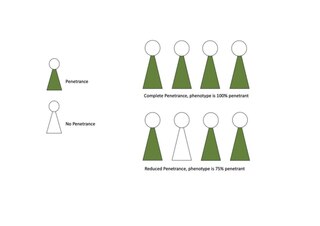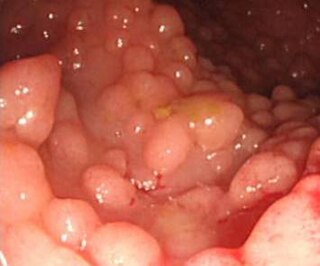Related Research Articles

Penetrance in genetics is the proportion of individuals carrying a particular variant of a gene (genotype) that also expresses an associated trait (phenotype). In medical genetics,the penetrance of a disease-causing mutation is the proportion of individuals with the mutation that exhibit clinical symptoms among all individuals with such mutation. For example:If a mutation in the gene responsible for a particular autosomal dominant disorder has 75% penetrance,then 75% of those with the mutation will go on to develop the disease,showing its phenotype,whereas 25% will not.

Breast cancer type 1 susceptibility protein is a protein that in humans is encoded by the BRCA1 gene. Orthologs are common in other vertebrate species,whereas invertebrate genomes may encode a more distantly related gene. BRCA1 is a human tumor suppressor gene and is responsible for repairing DNA.

BRCA2 and BRCA2 are human genes and their protein products,respectively. The official symbol and the official name are maintained by the HUGO Gene Nomenclature Committee. One alternative symbol,FANCD1,recognizes its association with the FANC protein complex. Orthologs,styled Brca2 and Brca2,are common in other vertebrate species. BRCA2 is a human tumor suppressor gene,found in all humans;its protein,also called by the synonym breast cancer type 2 susceptibility protein,is responsible for repairing DNA.

Women's College Hospital is a teaching hospital in Toronto,Ontario,Canada. It is located in downtown Toronto at the north end of Hospital Row,a section of University Avenue where several major hospitals are located. It currently functions as an independent ambulatory care hospital.

Mary-Claire King is an American geneticist. She was the first to show that breast cancer can be inherited due to mutations in the gene she called BRCA1. She studies human genetics and is particularly interested in genetic heterogeneity and complex traits. She studies the interaction of genetics and environmental influences and their effects on human conditions such as breast and ovarian cancer,inherited deafness,schizophrenia,HIV,systemic lupus erythematosus and rheumatoid arthritis. She has been the American Cancer Society Professor of the Department of Genome Sciences and of Medical Genetics in the Department of Medicine at the University of Washington since 1995.

Hereditary breast–ovarian cancer syndromes (HBOC) are cancer syndromes that produce higher than normal levels of breast cancer,ovarian cancer and additional cancers in genetically related families. It accounts for 90% of the hereditary cancers. The hereditary factors may be proven or suspected to cause the pattern of breast and ovarian cancer occurrences in the family. The name HBOC may be misleading because it implies that this genetic susceptibility to cancer is mainly in women. In reality,both sexes have the same rates of gene mutations and HBOC can predispose to other cancers including prostate cancer and pancreatic cancer. For this reason,the term "King syndrome" has recently come into use. The new name references Mary-Claire King who identified the genes BRCA1 and BRCA2.
Sharsheret is a nonprofit organization with the goal of supporting Jewish women diagnosed with breast cancer and ovarian cancer. Through its work and research efforts,Sharsheret provides healthcare resources,financial assistance,communal support,and educational programs to thousands of women and their families in the United States. Sharsheret has offices in California,Florida,Illinois,New Jersey and New York. They are headquartered in Teaneck,New Jersey. Sharsheret primarily works with young women and Jewish families as Ashkenazi Jews are at higher risk of carrying a BRCA gene mutation,but also aids men and women from other backgrounds.

A BRCA mutation is a mutation in either of the BRCA1 and BRCA2 genes,which are tumour suppressor genes. Hundreds of different types of mutations in these genes have been identified,some of which have been determined to be harmful,while others have no proven impact. Harmful mutations in these genes may produce a hereditary breast–ovarian cancer syndrome in affected persons. Only 5–10% of breast cancer cases in women are attributed to BRCA1 and BRCA2 mutations,but the impact on women with the gene mutation is more profound. Women with harmful mutations in either BRCA1 or BRCA2 have a risk of breast cancer that is about five times the normal risk,and a risk of ovarian cancer that is about ten to thirty times normal. The risk of breast and ovarian cancer is higher for women with a high-risk BRCA1 mutation than with a BRCA2 mutation. Having a high-risk mutation does not guarantee that the woman will develop any type of cancer,or imply that any cancer that appears was actually caused by the mutation,rather than some other factor.
Thomas M. Kolb is an American radiologist specializing in the detection and diagnosis of breast cancer in young,predominantly high-risk premenopausal women. He has served as an assistant clinical professor of Radiology at Columbia University College of Physicians and Surgeons from 1994–2010. Kolb is double board certified,having received his training in pediatrics at the Albert Einstein College of Medicine in Bronx,New York,and in diagnostic radiology at the Columbia-Presbyterian Medical Center in New York.

In the Family is a 2008 documentary film,produced by Kartemquin Films,about predicting breast and ovarian cancer and the choices women make when they are faced with the dangers of a possible life-threatening disease. The film's director,Joanna Rudnick,tests positive for the familial BRCA mutation that increases her chances of developing breast cancer by 60%. Faced with these odds,Rudnick must examine her choices of possibly taking her chances or possibly having her breasts and ovaries removed.
Sir Bruce Anthony John Ponder FMedSci FAACR FRS FRCP is an English geneticist and cancer researcher. He is Emeritus Professor of Oncology at the University of Cambridge and former director of the Cancer Research UK Cambridge Institute and of the Cancer Research UK Cambridge Cancer Centre.

A hereditary cancer syndrome is a genetic disorder in which inherited genetic mutations in one or more genes predispose the affected individuals to the development of cancer and may also cause early onset of these cancers. Hereditary cancer syndromes often show not only a high lifetime risk of developing cancer,but also the development of multiple independent primary tumors.

Kenneth Offit is an American cancer geneticist and oncologist known for his discoveries with respect to the genetic bases of breast,colorectal,and lymphoid cancers. He is currently Chief of the Clinical Genetics Service and the Robert and Kate Niehaus Chair in Inherited Cancer Genomics at Memorial Sloan Kettering Cancer Center. Offit is also a member of the Program in Cancer Biology and Genetics at the Sloan-Kettering Institute and Professor of Medicine and Healthcare Policy and Research at Weill Cornell Medical College. He was previously a member of both the Board of Scientific Counselors of the National Cancer Institute and the Evaluation of Genomic Applications in Practice and Prevention working group of the U.S. Centers for Disease Control.
A preventive mastectomy or prophylactic mastectomy or risk-reducing mastectomy (RRM) is an elective operation to remove the breasts so that the risk of breast cancer is reduced.
Douglas F. Easton FMedSci is a British epidemiologist who conducts research on the genetics of human cancers. He is Professor of Genetic Epidemiology and Centre for Cancer Genetic Epidemiology at the University of Cambridge. He founded Cambridge's Cancer Research UK Genetic Epidemiology Unit in 1995,and was a Principal Research Fellow there from 2001 to 2011. He is a Professorial Fellow of Homerton College,Cambridge.
Susan M. Domchek is an oncologist at the University of Pennsylvania,Executive Director of the Basser Center for BRCA,the Basser Professor in Oncology at the Perelman School of Medicine,and Director of the Mariann and Robert MacDonald Cancer Risk Evaluation Program at Penn Medicine. She has authored more than 250 articles in scholarly journals. In 2018,Domchek was elected to the National Academy of Medicine.
Maria Jasin is a developmental biologist at the Memorial Sloan Kettering Cancer Center. She is known for studying homologous recombination,a method in which double-strand breaks in DNA strands are repaired,and for discovering the role of BRCA1 and BRCA2 in cancers.

Jórunn Erla Eyfjörð is an Icelandic molecular biologist and professor emerita at the Faculty of Medicine of the University of Iceland. She is known for her research on breast cancer genetics.
Lorraine L. Lipscombe is a Canadian endocrinologist. In 2021,Lipscombe was appointed the director of the University of Toronto's Novo Nordisk Network for Healthy Populations.

Breast and ovarian cancer does not necessarily imply that both cancers occur at the same time,but rather that getting one cancer would lead to the development of the other within a few years. Women with a history of breast cancer have a higher chance of developing ovarian cancer,vice versa.
References
- 1 2 "Dr. Kelly Metcalfe". Outstanding Graduates. Retrieved February 15, 2022.
- 1 2 "How Dr. Kelly Metcalfe has been breaking new ground in breast cancer research for twenty years". Women of Influence. October 2, 2017. Retrieved February 15, 2022.
- ↑ "Preventing the Worst". University of Toronto Magazine. June 8, 2004. Retrieved February 15, 2022.
- ↑ "CIHR New Investigator Awards". University of Toronto. July 17, 2012. Retrieved February 15, 2022.
- ↑ "Second diagnosis of breast cancer increased by mutation". University of Toronto. April 20, 2011. Retrieved February 15, 2022.
- ↑ "Kelly Metcalfe receives CIHR grant to develop decision tool to aid in breast cancer management". University of Toronto. February 28, 2012. Retrieved February 15, 2022.
- ↑ "Bloomberg Professorships". University of Toronto. Archived from the original on February 11, 2022. Retrieved February 15, 2022.
- ↑ "Kelly Metcalfe selected as part of pan-Canadian cancer research project". University of Toronto. June 24, 2014. Retrieved February 15, 2022.
- ↑ "Freida Chavez, Linda McGillis Hall & Kelly Metcalfe honoured at U of T Salutes! Event". University of Toronto. 2016. Retrieved February 15, 2022.
- ↑ "Dr. Kelly Metcalfe elected to the Royal Society of Canada's College of New Scholars, Artists and Scientists". University of Toronto. 2017. Retrieved February 15, 2022.
- ↑ "Dr. Kelly Metcalfe named Fellow of Canadian Academy of Health Sciences". University of Toronto. September 12, 2017. Retrieved February 15, 2022.
- ↑ "Dr. Kelly Metcalfe awarded Rising Star Alumni Award". University of Toronto. November 23, 2017. Retrieved February 15, 2022.
- ↑ "Kelly Metcalfe awarded grant through CCSRI for breast cancer gene research". University of Toronto. April 18, 2017. Retrieved February 15, 2022.
- ↑ "Professor Kelly Metcalfe appointed Acting Associate Dean, Research & External Affairs". University of Toronto. January 12, 2018. Retrieved February 15, 2022.
- ↑ "Four Bloomberg Nursing researchers receive CIHR project grants". University of Toronto. March 8, 2021. Retrieved February 15, 2022.
- ↑ "Bloomberg Nursing's Kelly Metcalfe is a 2021 Women of Action honoree". University of Toronto. April 23, 2021. Retrieved February 15, 2022.
- ↑ "Bloomberg Nursing Faculty Members Ranked Top Nursing Researchers in Canada". University of Toronto. March 25, 2019. Retrieved February 15, 2022.